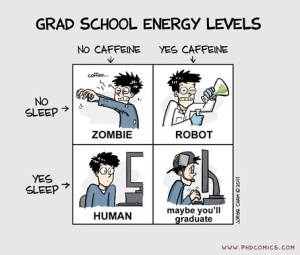A blog post from SOLES Ambassador and MA in Counseling with specialization in Clinical Mental Health Counseling, Lara Touckley:

- Find Your Balance
It’s hard to believe that pushing yourself academically, socially, as well as at home and at work, can be strenuous! As much as we’d love to finish all readings, assignments, AND do well in other areas in life, at times, it might be difficult to do it all (probably when you have 2 midterms, 3 papers and 5 assignments due). It’s important to remember, that although it’s recommended to finish your readings before class; it’s not punishable by death if you don’t! After all, there are only 24 hours per day. So prioritize! Deadlines are, after all, deadlines. Read some chapters before class, and leave others for when you have more free time. (But don’t forget to read them eventually; if they’ve been assigned to you then they’re [most probably] important.)
- Self-Care
Prioritize yourself! You’re acing everything; you’re on an academic roll- great for you, IF you’re taking care of yourself too. We oftentimes forget about our needs and ourselves. Well newsflash: if you’re not mentally and emotionally okay, then the perfect GPA you’ve worked so hard to achieve will start suffering the consequences. In short, everybody loses! So give studying your all, but give yourself your all too! Remember those things you once enjoyed and performed so often? Oh yeah, hobbies! Remind yourself of what they are and make sure you spoil yourself a little. (Don’t go neglecting school though..)
- Know How You Work, And Plan Accordingly
After years (and years and years) of studying, we all know how we work. If you read slow, give yourself extra time to finish the readings. If you’re a master at writing papers (then you’re in the right place!), then you know that it takes you less time to write an A-paper. Manage your time according to your strengths and not-so-strengths (I like to believe we don’t have weaknesses. Yes, some might call that denial). Do you understand best in class, or do you need to spare some time for office hours with your professor? Do study groups work better for you than studying individually? Ask yourself all these questions and go for it! Try to be as efficient as possible in as little time as possible.
- Get Involved
Psht, we heard that a lot right? Well, there’s a reason for that- it’s important! Dig around and find things that might be helpful for you in your professional development, and go for it! Have you already had plenty of experience? Perhaps performing research and reading articles might be helpful. Likewise, if you’ve done a lot of research, then volunteering and getting involved in the community can help!
It’s as important to do well academically, as it is in the community. As a professor once told us, “you write your own reference letter.”
- Rent Books
You can rent books from the library in order to save money, and then buy the book if you really like it! Otherwise, you can just rent your books online! If you enjoy reading off of a screen then that’s even better! Renting (and even buying) e-books are cheaper, and you can access them right away!
- Ask Away!
- Your colleagues might be able to help you if you ever need it. If they can’t, then the realization that you’re not the only “lost” student is a self-esteem booster! I would then advise to directly ask your professor about your inquiries.
- As for research opportunities, don’t be afraid to ask professors to work with them! Ideally, you would work with a professor whose interests are close to yours.
- Your advisor is there to, well, advise you! Personally, my advisor was a huge help to me. She/he can give suggest different places to volunteer, help you improve academically, etc.
- You can also ask us, SOLES Ambassadors, any questions you have and we’ll do the best we can to answer them!

